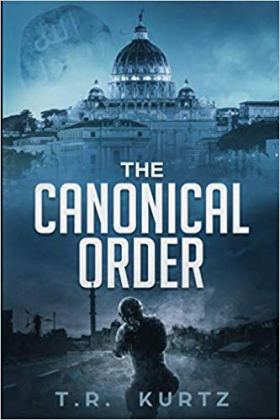Always on the prowl for solid thrillers falling between the cracks or under the radar, I discovered this gem, The Canonical Order by T.K. Kurtz, about a month ago.
Set in the present day, a group of radical Islamic terrorists is hell-bent on fulfilling an ancient prophecy to draw the West into an apocalyptic holy war. In the process, the Pope becomes a target, and after a bullet leaves him incapacitated, Chad Stryker makes it his personal mission to find out who’s behind the attack, and end them once and for all.
Stryker, a former CIA operative turned agent of the Vatican’s own intelligence service, networks with a number of secret groups rich with history and shadowy mystique. Among them are the Canonical Order, a private intelligence organization with ties to the Knights of Malta. But the closer Stryker gets to the truth, the more he realizes that something bigger is playing out behind the scenes—leading to a shocking twist as a more sinister conspiracy emerges, kicking the story into overdrive.
Think Dan Brown meets Steve Berry . . . T.R. Kurtz’s The Canonical Order is a page-turning, rip-roaring debut that’s perfect for fans of those authors or Raymond Khoury’s Templar series.
Though his book came originally came out last fall, I just recently reached out to Kurtz, who agreed to go on the record for our Five Questions segment. Read the Q&A below, then click here to order your copy of The Canonical Order today.

TRBS: First and foremost, congratulations on the publication of your first book! How did you come up with the story idea for this one?
Kurtz: Thanks, Ryan. The story started with the idea that someone would try to assassinate the Pope. I then began working through the reasons why, geopolitical factors at work, what was happening in the world in the present day, the global threats, and historical conflicts. Obviously, groups like ISIS stood out. I cross-referenced those factors with some of the recruiting tactics of ISIS, their doomsday vision, and prophesies by the prophet Muhammad.
A picture began to emerge that the group might try to literally do what they said they’d do on social media, “Go to Rome,” especially if that meant that they could draw in the rest of the Western world. The ISIS Easter attacks against the Catholic Church in Sri Lanka this year made the story a little too real, but that’s what we’re dealing with. The radical ideology and its foundation continue to be promoted by individuals seeking cause destruction and exploit the vulnerable.
As I started to think of an organization to counter the threat, I thought it would be interesting to use a covert action alternative to the standard three letter US agency. So I started kicking around the idea of a covert action arm of the Vatican and what that might look like. I looked back into history and there were organizations that essentially conducted covert action on behalf of the Catholic Church. So I mixed a bit of history with a few conspiracy theories and developed a fictional elite intelligence agency run out of the Vatican with paramilitary capabilities of the Knights of Malta and the intelligence networks of the Jesuits.
TRBS: What kind of research did you have to do before actually sitting down to write, and what is your writing process like? Do you outline ahead of time, keep regular writing hours?
Kurtz: I’m constantly reading about global affairs, so some of the research was based on keeping up on what was happening around the world. The historical research of the Catholic Church, Knights of Malta and their membership, and covert action undertaken by surrogates of the Catholic Church took a good bit of time, but was needed for the premise of a top-flight intelligence agency at the Vatican to be plausible.
My favorite research is imaging and exploring what the protagonist and book characters would like in their everyday life. Their favorite music, food, weaponry, hobbies, and drink. The drink part can be particularly disabling during editing.
Regarding outlining, I do outline because I need events to anchor the book and understand in general where things are going. I use a bunch of building blocks to provide clarity where I am going, who is involved, and the obstacles to overcome. Once I have the general outline, I start writing and attempt to let everything flow together. In the first book, I had a goal of 750 words a day and a set duration of time to write every day, which I tracked. That allowed me to write version one in a relatively set amount of time. My travel schedule now is so unpredictable that my progress has been a bit less steady. I’m looking to get back to a predictable writing schedule.
TRBS: Which authors inspired you to want to become a writer yourself, and why?
Kurtz: The authors that initially inspired me were some authors of classics to include Forsyth, Ludlum, and John le Carré. Those guys lead me to Thor, Flynn, Mills, and Greaney, to name a few. I liked the way that the writers could not only entertain, but also show a bit of the world and inform the reader. I wanted to try to do that in my own way using my own experiences to give a unique optic.
Ultimately, I started writing because I love the craft. You can pound on your craft every day and improve without limit. You can deploy all your skills and never run out of opportunities to create. When I’m writing I’m fully in “p-squared” territory, where purpose meets passion. And I get to “do” things in the books that I enjoy in real life. What’s not to like?
TRBS: What’s the last great book you read, and what thrillers are currently on your TBR list?
Kurtz: I was a bit late to the party, but I just read Spymaster and it was a great read. Brad Thor is an absolute master of the craft.
There’s a ton on my TBR list. I don’t know if there’s ever been a time in history where we’ve had more thriller writer talent than right now. With that as the backdrop, I’ve got tons of stuff on pre-order. Brad Thor’s Backlash, Matt Betley’s Rules of War, Daniel Silva The New Girl, and Jack Carr’s True Believer. For me, it’s the ultimate two-for-one where I get to read a great book and incrementally study the craft of writing.
TRBS: Lastly, what’s next for you now that The Canonical Order is out, and can readers expect to see more of Chad Stryker in the future?
I should have a follow-up of The Canonical Order series out by early 2020. Stryker will be part of the book but as part of the broader organization, not the protagonist. Elite organizations tend to attract prime movers who have the ability to play protagonist, so I think this is realistic, though possibly series suicide. The next protagonist will be an elite operator as well, but an anti-hero. Writing Stryker is a lot of fun, but I wanted to write an anti-hero. Stryker is going to have to take a vacation and let another operator rain hate down on “los malos.”
Praised as “one of today’s finest book reviewers” by New York Times bestselling author Gayle Lynds, Ryan Steck (“The Godfather of the thriller genre” — Ben Coes) has “quickly established himself as the authority on mysteries and thrillers” (Author A.J. Tata). Steck also works full-time as a freelance editor and pens a monthly thriller column for CrimeReads. For more information, be sure to follow him on Twitter and Facebook. He currently lives in Southwest Michigan with his wife and their six children.
